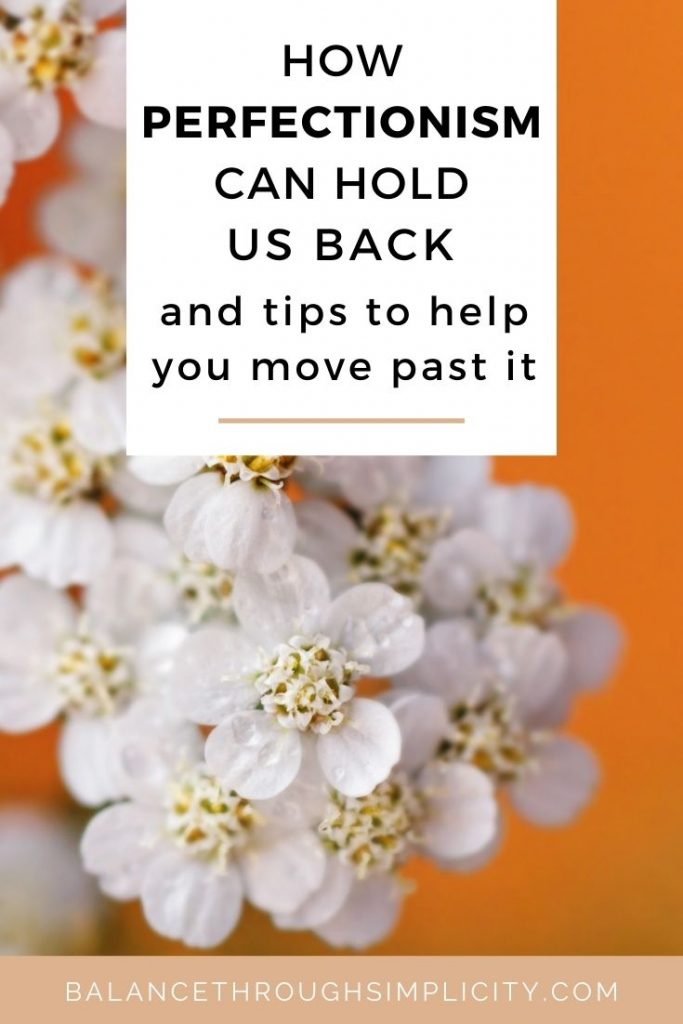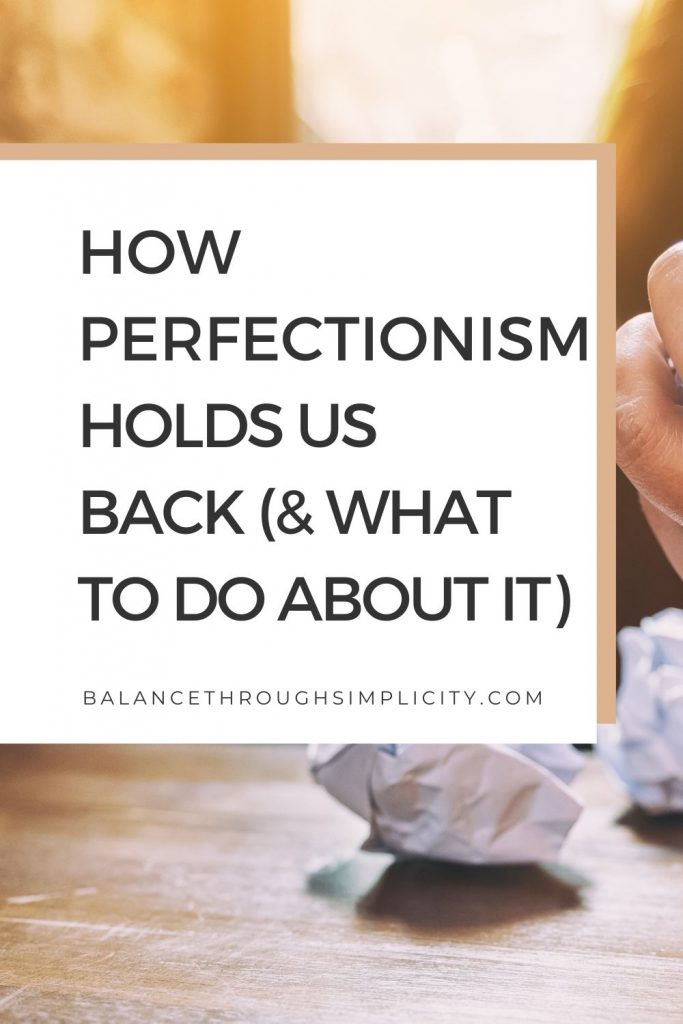HOW PERFECTIONISM CAN HOLD US BACK
Perfectionism is something I’ve struggled with for years. Although it brings many benefits, a perfectionist mindset can hold us back and stop us trying and achieving new things. If you find yourself continually striving to achieve 100%, check out this post on how perfectionism can hold us back and how to change your all-or-nothing thoughts.
MY CHALLENGE AGAINST PERFECTIONISM
I’m a perfectionist but I’ve come to terms with the fact that life doesn’t often allow for perfect. It’s a daily challenge to say to myself ‘good is good enough’ and for me to be ok with that.
I love to do, try and achieve but I’ve realised that I’m able to do more of that when I’m not hung up on whether I do, try and achieve everything perfectly.
I just don’t have enough time, energy and emotional robustness to give 100% to everything, all of the time!
In the past though, I’ve struggled with perfectionism a lot…
- I wanted to get good grades at school and felt a failure if I didn’t get them.
- I wanted a successful career but then floundered when I felt I couldn’t do it all properly (whilst juggling little kids and long working hours). ‘I’m only human’ didn’t count as a good enough reason to me!
- Even now, I have to stop myself faffing around before I hit publish on a blog post. It’ll never be perfect but I’m sure my readers would prefer to have some information to help them rather than none at all.
Perfectionism is a mindset that challenges me daily!
HOW PERFECTIONISM AFFECTS SIMPLE LIVING
You may be wondering why I’ve written a post about perfectionism on a blog about simple living? Well, much of what I’ve learnt about simplifying my life comes from my mindset and the way I approach and think about things.
Perfectionism (although it has some positive attributes) is something that I’ve found to be far from helpful in my life.
However, since learning how to challenge my perfectionism and get on top of it, I’ve found I’m much less hard on myself and happy to try things even though I’m not sure how they’ll end. Such a good way to simplify my life!
MINDSET AND SIMPLE LIVING
This post isn’t an in-depth look at the psychology of perfectionism or how to overcome it, but it’s more about the importance of mindset and attitude in relation to simple living (and the things that tend to complicate it).
This post is also a reminder that simple living is about being intentional and that the intention behind how we think about things can have a huge impact on how we choose, act and retain things in our life that truly serve us and keep out those that don’t.
I’ve found that perfectionism complicates my choices, my decisions and my outlook so I intentionally choose to knock it on the head whenever I feel it resurfacing! There are plenty of other negative thought patterns which over-complicate our lives. I’m not suggesting for a moment that it’s easy to dispel them or pretend they’re not there because mindset and mental health issues can be difficult to overcome. I recognise that many struggle (as I have in the past) and there’s no quick-fix solutions sometimes.
If there’s one take-away from this post, it’s to realise that a decluttered and simpler life goes beyond the physical decluttering of our homes. You can declutter your mind and thoughts using the same principles as decluttering your home!
Mindsets and thought patterns that are negative and self destructive will only serve to distract you and take you away from creating your best life.

THE PROS AND CONS OF PERFECTIONISM
Perfectionism does have its upsides.
I’m happy to work hard, be meticulous, put in the effort, take action and question things. I believe in setting the best example I can and not settling for a life ‘making do’ (not so much financially, but just in getting the most out of life and the opportunities it brings).
However, perfectionism can also have its downsides.
It can hold us back, stop us from doing things or make us disproportionately down and despondent when things don’t go right or we don’t perceive them as good enough.
Perfectionism can hinder our efforts to try new experiences, learn skills or take on challenges because we get caught up in thinking too much about getting it right and not about the learning or the journey itself.
PROBLEMS THAT ARISE BECAUSE OF PERFECTIONISM
If you’re prone to perfectionism, maybe you recognise some of the following?
- Fear of failure – what if you get it wrong, don’t achieve 100% or don’t complete something? Is it about the failing or do you think failure is a sign of weakness?
- All or nothing approach – if you can’t do it perfectly then there’s no point starting or doing it at all. How many things do we miss out on in life as a result?
- Desire to be in control – if it’s perfect then you know you’re totally in control and being in control makes you feel safe
- Fear of being out of control – if it’s not perfect then it’s beyond your control and you can’t cope with that
- It’s never good enough – constantly chasing and pushing to achieve perfection and putting yourself down when you feel it’s not perfect enough
- Procrastination – putting off decisions to do something because you worry about not being able to do it as well as you want or you’re concerned what people will think
- Unrealistic expectations – setting standards and goals that just aren’t possible to achieve (either at all, or without making big sacrifices)
Do any of these sound familiar to you?
WHAT I’VE LEARNT IN MY PURSUIT OF PERFECTION
I’ve learnt so many lessons in my life-long pursuit of perfection, particularly since I became a mum when my commitments are greater and I’m conscious that my children follow and learn from my example.
Here are some of the lessons I learnt:
- Life is a journey, no experience is ever wasted, whether you finish or not, whether you achieve 100% or not
- Every challenge is a learning opportunity about life and about ourselves
- It’s not just the final destination that matters but learning (and failing) teaches us just as much
- Don’t give up on something because it’s not going perfectly, you’ll have gained something even if you didn’t achieve it to your perfectionist standards
- Consider the drain on your emotions when you’re constantly trying to achieve perfection, running on adrenalin and putting yourself at risk of total burnout. Is it worth it and what would be the impact on you and your family?
- What happens when it goes wrong? Do you plunge into despair and beat yourself up because it’s something you’ve done wrong? What about if it’s actually nothing to do with you but instead down to other factors beyond your control or that you couldn’t foresee?
- Does it really matter if you’re perfect or does anyone else even notice? For example, who cares if your home has a bit of dust. Will anyone notice but you? Surely visitors are there to see you, not your home!
CHANGING YOUR PERFECTIONIST MINDSET
Come to terms with the fact that you can’t be in control or a perfectionist about every single part of your life.
It’s virtually impossible to prioritise everything in your life or on your to do list.
If you have to be a perfectionist because that’s at the core of who you are, then why not pick one or two things with which you can try to attain near perfection?
For a while, learn to let go of the rest and be content with a “I’ve tried my best and it’s good enough for now” attitude. It may take time but this is such a liberating experience and takes a massive weight off your shoulders! I think it gets easier with practice too! Use the resources you’ve freed up (energy, time, possibly financial) by doing this in another, more productive way.
Remember that life come in stages, you constantly have to adapt and change. You’ll never get things perfect as life doesn’t stay still long enough and the goal posts keep changing.
Never let your pursuit of perfectionism stop you doing things. For example, you may want to start learning the piano. So, don’t set out to be a concert pianist, maybe just learn for fun, so you can play Twinkle Twinkle Little Star whilst your kids sing along. It’s fun, you’re still learning and you can be proud of doing it.

PRACTICE NOT BEING PERFECT!
It may sound weird but sometimes I practice not being perfect just to get myself used to ‘being ok with being ok’! See what you think?
- Deliberately leave some clothes out on a chair instead of putting them in your wardrobe
- Let a room stay slightly messy for a while and fight the urge to make it neat
- Walk out of the house without doing the dishes
How did it make you feel? Practice it. Did it really make such a difference to you in the end?
Spend quality time, energy and money on living intentionally with your family. Learn to ignore any negative emotions that resurface from time to time when you realise that things aren’t as perfect as you want them to be. Instead remember that life is meant to be lived, in the moment, with an eye on the future.
Don’t waste it trying to achieve the unachievable, all the while missing out on the life you have right now.
SEEK PROGRESS NOT PERFECTION
Don’t get me wrong. I’m not saying we should be happy with not trying hard, or pushing ourselves to do the very best, or not have dreams and goals and a desire to succeed. These are all fantastic qualities, make us ambitious for the future and set a great example for our children.
But, I would encourage you to think about progress, not perfection. Aim high but realistic, set a good example, do a good job and always do your best.
If you’re a working mum for example, recognise that sometimes your focus will be 90% work, 10% family, other times it will be 90% family, 10% work. Go with the flow and whatever needs prioritising at the time.
Life is about constantly learning, changing, adapting, taking on new challenges, flying by the seat of our pants. There’s no room for a perfectionist attitude that serves us poorly.
Sometimes we get it right, other times we get it wrong but it’s the journey, the progress, that counts. What we learn when we fail can be just as important as what we learn when we succeed.
Above all remember, seek progress not perfection!
CONCLUSION
Perfectionism can be a benefit and a hindrance. In this post I look at some of the ways that an all-or-nothing approach can both help you and hold you back.
In the pursuit of an easier life, I found that one of the most successful ways of simplifying things is to challenge my perfectionist mindset.
It frees me up to be happier, more relaxed, less stressed out and much more open to whatever comes my way. I end up achieving more without the unrealistic expectations I used to put on myself!
HELPFUL RESOURCES ON MINDSET
- 10 things to declutter that aren’t things – Decluttering is so much more than getting rid of our physical stuff
- Essential mindsets to help you get more out of life – How you think determines you feel (and the actions and decisions that follow)
- Master Your Mindset – A powerful workbook with practical self-care tips and plans for a healthy mind
- Why kind words matter – the story we tell ourselves
- 30 journal prompts for self-discovery
DON’T MISS OUT!
I’m Antonia and on this blog I share practical inspiration to simplify your home, time and life. Follow me on Instagram, Facebook and Pinterest! You can also subscribe to Balance Through Simplicity and receive regular simplicity tips straight to your inbox for free. Make sure you never miss an article plus you’ll get a copy of my free Declutter Starter Kit as a welcome gift!

